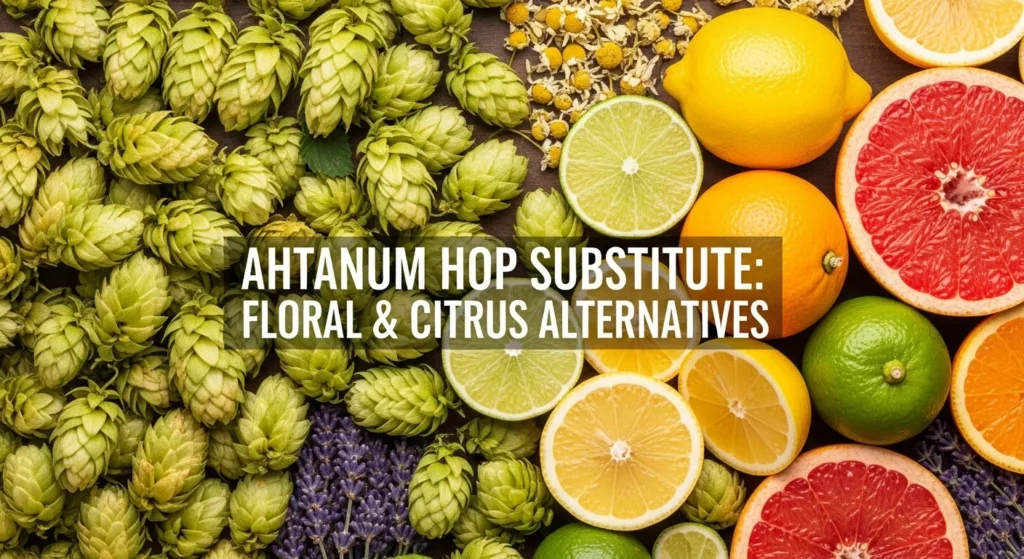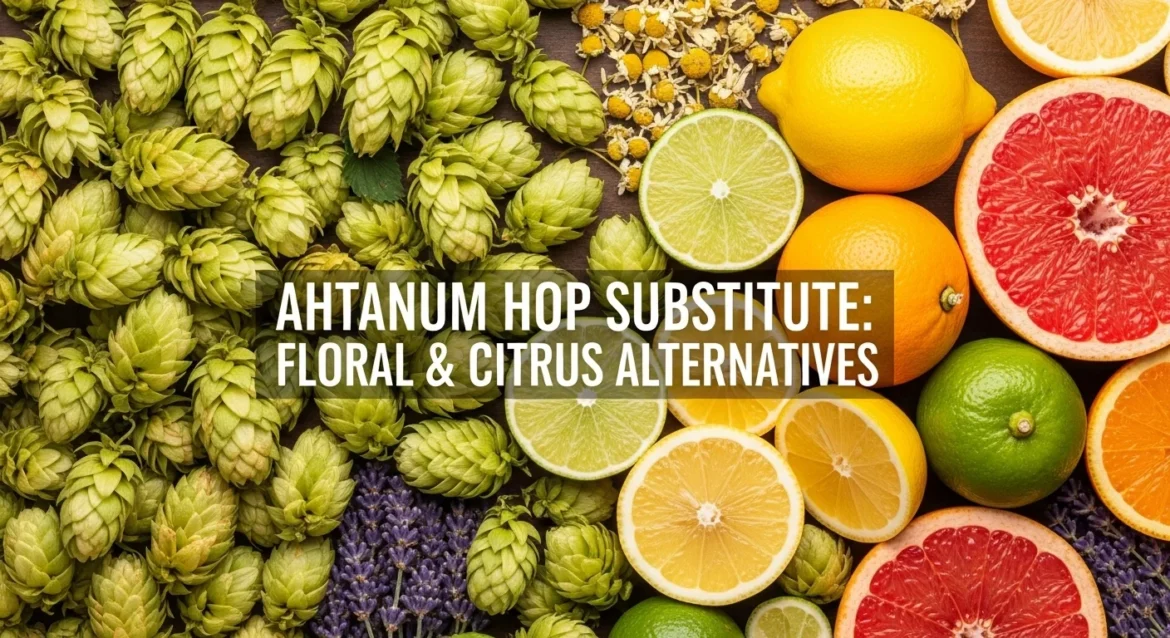Find the best Ahtanum hop substitutes with floral and citrus character. Discover American alternatives for pale ales, IPAs, and wheat beers.

Planning that perfectly balanced pale ale with Ahtanum hops only to discover they’re sold out at your supplier? I’ve faced that exact frustration more times than I care to admit in my brewing career. This versatile American aroma hop has developed a dedicated following for its distinctive floral-citrus-earthy balance, creating demand that occasionally exceeds availability at local suppliers. The good news? Several American-grown hop varieties can replicate those distinctive floral, citrus, and earthy notes that make Ahtanum essential for balanced hop-forward beers.
Finding the right Ahtanum hop substitute requires understanding what makes this hop special beyond just being American. It’s about capturing that distinctive combination of gentle floral character, grapefruit-citrus backbone, and subtle earthy complexity with moderate alpha acids that creates approachable hop expression. After brewing with Ahtanum and testing various alternatives over the past decade, I’ve identified which substitutes actually deliver on their balanced promises and which fall disappointingly short when refined American hop character matters.
This guide explores proven alternatives that maintain your beer’s intended flavor profile while offering interesting variations. Whether you’re brewing an American pale ale, IPA, or wheat beer, you’ll find practical solutions that work.
Understanding Ahtanum’s Balanced Character
Ahtanum emerged in 1976 from USDA breeding as open-pollinated seedling selection from the Yakima region. This aroma hop delivers floral, citrus, earthy, grapefruit, and piney characteristics with moderate alpha acids of 5.7-6.3%. What distinguishes Ahtanum from other American hops is its remarkably balanced floral-citrus-earthy combination that creates approachable complexity rather than aggressive single-note character.
The hop’s development represented American breeding’s emphasis on versatile aroma hops suitable for various styles. Ahtanum’s moderate alpha acids provide reasonable bittering efficiency while its refined floral-citrus character creates genuine complexity when used in late additions and dry hopping where homebrewing equipment can showcase delicate aromatics.
When I first brewed with Ahtanum in an American pale ale seven years ago, the gentle floral aroma with grapefruit-earthy backing created exactly the balanced hop character I sought. That refined, approachable complexity is Ahtanum’s magic – interesting enough to engage yet subtle enough to support malt character.
Top Ahtanum Hop Substitute Options
Cascade: Classic American Alternative
Cascade stands as the most logical Ahtanum substitute for brewers seeking American floral-citrus character. This legendary variety delivers grapefruit, floral, spicy, and citrus characteristics with moderate alpha acids of 4.5-7% that match Ahtanum’s range closely.
Released in 1972, Cascade defined American Pale Ale through approachable citrus-floral character. The hop shares Ahtanum’s emphasis on balanced floral-citrus while offering more pronounced grapefruit and less earthy complexity, creating brighter alternatives when classic American character matters.
I’ve successfully substituted Cascade for Ahtanum in pale ales and IPAs by using approximately equal weights thanks to similar alpha acids. The beer’s character maintains American floral-citrus nature while shifting toward brighter grapefruit rather than earthy-floral, creating classic American hop-forward profiles. Use Cascade when you want proven American character with wide availability from the Brewers Association standards.
Willamette: Earthy-Floral Balance
Willamette brings earthy, herbal, floral, spicy, and fruity characteristics with moderate alpha acids of 4-6%. This American variety bred from English Fuggle provides earthy-floral character similar to Ahtanum’s balanced nature.
Released by USDA breeding in 1976 (same year as Ahtanum), Willamette shares similar breeding heritage. The hop’s emphasis on earthy-floral character approximates Ahtanum’s complexity while offering more pronounced earthy-herbal and less citrus, creating alternatives when subtle character matters.
When substituting Willamette for Ahtanum, use approximately equal weights thanks to similar alpha acids. The beer’s character maintains earthy-floral nature while shifting toward herbal-spicy rather than citrus-piney, creating refined profiles suitable for English-style ales and balanced American beers.
Amarillo: Bold Citrus-Floral
Amarillo delivers orange, lemon, grapefruit, floral, and tropical characteristics with higher alpha acids of 8-11%. This American variety provides pronounced citrus-floral character that can approximate Ahtanum’s complexity with bolder intensity.
Released from Virgil Gamache Farms breeding, Amarillo shares emphasis on citrus-floral character. While offering higher alpha acids and more intense citrus, Amarillo’s clean floral backing creates alternatives when bold American hop character matters more than Ahtanum’s subtle refinement.
Use approximately 60-75% of Ahtanum quantities when substituting Amarillo to compensate for higher alpha acids. The beer’s character emphasizes bold orange-citrus-floral rather than gentle grapefruit-earthy, creating modern hop-forward profiles suitable for contemporary IPAs.
Centennial: Super Cascade
Centennial brings floral, citrus, lemon, orange, and pine characteristics with higher alpha acids of 9.5-11.5%. This American classic provides enhanced Cascade-like character that can replace Ahtanum’s citrus-floral with increased intensity.
Released in 1990 as “Super Cascade,” Centennial shares Cascade’s citrus-floral emphasis. While offering higher alpha acids and bolder character, Centennial’s balanced citrus-floral profile creates alternatives when moderate bittering with strong aromatics matters.
When substituting Centennial for Ahtanum, use approximately 55-65% of original amounts to compensate for significantly higher alpha acids. The hop’s character maintains citrus-floral nature with pronounced lemon-orange and pine rather than earthy subtlety, creating bold American profiles.
Liberty: American Noble-Type
Liberty delivers spicy, herbal, mild, floral, and noble-like characteristics with low alpha acids of 3-5%. This American variety bred from Hallertau Mittelfrüh provides gentle floral-spicy character similar to Ahtanum’s refined nature.
Released by USDA breeding in 1991, Liberty represents American attempts to recreate European noble character. While lacking Ahtanum’s citrus component, Liberty’s clean floral-herbal profile creates subtle alternatives when gentle character matters more than bold citrus.
Use approximately 15-30% more Liberty by weight when substituting for Ahtanum to compensate for lower alpha acids. The beer’s character shifts toward noble-like floral-herbal rather than citrus-earthy, creating refined profiles suitable for lagers and wheat beers.
Glacier: Balanced American
Glacier offers earthy, floral, citrus, and herbal characteristics with moderate alpha acids of 5.5-9%. This American variety provides balanced character similar to Ahtanum’s earthy-floral-citrus combination.
Released from USDA breeding, Glacier shares emphasis on balanced American character. The hop’s specific earthy-floral-citrus profile creates direct alternatives to Ahtanum’s refined complexity with slightly different emphasis.
When substituting Glacier for Ahtanum, use approximately 80-100% of original amounts depending on specific alpha acids. The hop’s balanced character approximates Ahtanum’s earthy-floral-citrus nature making it excellent direct substitution when available.
Blending Strategies for Complete Substitution
The 70/30 Cascade-Willamette Blend
My most successful Ahtanum replacement combines 70% Cascade with 30% Willamette. This blend captures Cascade’s clean citrus-floral while Willamette adds earthy-herbal complexity approximating Ahtanum’s complete floral-citrus-earthy profile. The combination creates more authentic character than either hop alone.
Calculate your total hop bill first, then split according to this ratio for all additions. Use approximately equal total quantities to original Ahtanum amounts thanks to similar combined alpha acids while achieving balanced American hop character.
The Modern American Approach
For bolder hop-forward character, blend 60% Amarillo with 40% Cascade. This combination emphasizes Amarillo’s orange-citrus while Cascade adds grapefruit-floral creating layered citrus complexity with modern intensity.
Use reduced quantities (approximately 65-75% of original Ahtanum amounts) to compensate for higher combined alpha acids. The bold citrus character suits contemporary IPAs and hop-forward pale ales.
Single-Hop Simplicity
Sometimes simplicity wins. For straightforward beers where classic American character matters most, Cascade alone provides the most direct citrus-floral substitution at equivalent weights. The hop’s proven performance and wide availability make it ideal when reliable character defines the recipe.
For beers demanding closest alpha acid and character matching, Glacier by itself works beautifully at similar quantities when available. The hop’s balanced nature creates compelling direct alternatives.
Beer Style Considerations
American Pale Ales
These balanced hop-forward styles showcase Ahtanum beautifully. Cascade or Cascade-Willamette blends work exceptionally well as substitutes, providing approachable citrus-floral character that defines accessible American brewing.
Use moderate hopping rates (1.5-2.5 oz per gallon total) with balanced bittering (30-45 IBUs) and generous late additions. American pale ale brewing demonstrates that balance creates drinkability in session-strength hop-forward beers.
IPAs and Session IPAs
Hop-forward styles benefit from Amarillo or Centennial substitutions that provide bold citrus-floral character suitable for modern hop-focused brewing.
Use generous hopping rates (2-4 oz per gallon total) with moderate-high bittering (40-65 IBUs) and substantial late additions and dry hopping. Modern IPA brewing emphasizes aromatic complexity alongside firm bitterness.
Wheat Beers and Witbiers
Light wheat styles showcase Liberty or Willamette where gentle floral-herbal character complements wheat’s grainy sweetness and yeast-derived esters.
Use restrained hopping rates (0.75-1.5 oz per gallon total) allowing wheat malt and yeast character to remain prominent. Late additions work best, letting hop character support rather than dominate wheat beer profiles.
Here is the comparison chart:
Ahtanum Hop Substitute Comparison Chart – Alpha Acids, Flavors, and Beer Style Compatibility
Timing Your Hop Additions for Balanced Character
Moderate Bittering (60 Minutes)
Ahtanum’s moderate alpha acids (5.7-6.3%) provide reasonable bittering efficiency. Use Ahtanum substitutes moderately at 60 minutes to establish baseline bitterness without excessive hop flavor from extended boiling.
I typically use 0.5-1 oz per gallon at 60 minutes with Ahtanum substitutes to establish baseline bitterness around 25-40 IBUs appropriate for American pale ales and balanced IPAs. The moderate bittering supports hop character without harsh edges.
Flavor Additions (10-20 Minutes)
This window captures floral-citrus character beautifully. All Ahtanum substitutes excel here, releasing citrus and floral aromatics that integrate smoothly.
Add 0.5-1 oz per gallon at 15 minutes for hop-forward styles. This timing extracts maximum flavor while preserving aromatics that would be lost during extended boiling.
Late Additions and Whirlpool
The final 5 minutes and whirlpool at 170-180°F for 20-30 minutes maximize floral-citrus character while controlling bitterness. This technique suits all Ahtanum substitutes by preserving delicate aromatics.
Use generous late quantities (1-2 oz per gallon combined) for modern pale ales and IPAs. The controlled temperature extracts aromatics while limiting additional bitterness.
Dry Hopping Excellence
Dry hopping extracts pure floral-citrus aromatics without bitterness. Add hops when fermentation is 75% complete (around day 3-4) to maximize biotransformation where yeast enhances hop-derived flavors.
Use moderate-generous dry hop quantities (1.5-3 oz per gallon for IPAs, 1-2 oz per gallon for pale ales, 0.5-1 oz per gallon for wheat beers). Cascade and Amarillo benefit from 3-5 day contact time for optimal extraction.
Adjusting for Alpha Acids and Character
Understanding Ahtanum’s Moderate Profile
Ahtanum’s moderate alpha acids (5.7-6.3%) create balanced bittering suitable for various styles. Most substitutes have similar or higher alpha acids requiring minimal to moderate quantity adjustments.
Use this formula: (Ahtanum AA% ÷ Substitute AA%) × Original Amount = Substitute Amount. For example: (6% ÷ 10%) × 2 oz = 1.2 oz of Amarillo needed to replace 2 oz of Ahtanum for equivalent bitterness.
Oil Content and Aromatic Impact
Ahtanum’s moderate oil content creates solid aromatic impact when dry hopped. Substitutes with different oil compositions emphasize different flavors – Cascade provides grapefruit-floral, Amarillo adds orange-tropical, and Willamette contributes earthy-herbal complexity.
Water Chemistry for Balanced Expression
Moderate Sulfate Balance
Balanced American pale ales utilize moderate sulfate profiles (100-200 ppm) that accentuate hop character without creating harsh edges inappropriate for balanced brewing.
For Ahtanum substitutes in pale ales, target sulfate-to-chloride ratios of 1.5:1 to 2:1. This mineral balance supports hop character while maintaining smooth drinkability appropriate for session-strength beers.
Chloride for Mouthfeel
Some brewers prefer balanced sulfate-chloride profiles (150 ppm each) that create rounder mouthfeel while maintaining hop character. Experiment to find preferred mineral balance for your palate.
Yeast Strain Synergies
Clean American Ale Yeast
For hop-forward styles, clean American yeasts (WLP001/US-05, Wyeast 1056) provide neutral canvases where Ahtanum substitutes’ floral-citrus character expresses beautifully.
Ferment at moderate temperatures (66-68°F) to minimize yeast-derived flavors. The clean profile lets hop character dominate without competition.
English Ale Yeast Complement
For ESBs and English-style ales, English yeasts (WLP002, Wyeast 1968) create moderate fruity esters that complement rather than compete with floral-citrus hop character.
Ferment at appropriate temperatures (65-68°F) encouraging balanced ester production that adds complexity without overwhelming refined hop aromatics.
Sourcing and Availability
Ahtanum Accessibility
Ahtanum enjoys moderate availability through American hop suppliers. When available, expect moderate pricing ($12-16 per pound) comparable to other American aroma varieties.
The hop’s balanced character maintains steady demand among brewers crafting approachable hop-forward beers, though more distinctive varieties sometimes overshadow its refined subtlety.
Substitute Availability
Most Ahtanum substitutes enjoy excellent availability. Cascade, Centennial, and Willamette stock reliably year-round through major suppliers at competitive prices ($10-16 per pound). Amarillo maintains good availability through specialty suppliers. Liberty and Glacier face moderate availability as less common varieties.
Storage Best Practices
Store all hops in oxygen-barrier bags in your freezer at 0°F or below. Delicate floral-citrus aromatics are vulnerable to oxidation and should be used within 6-9 months for peak character.
Common Substitution Mistakes
Wrong Alpha Acid Calculations
Failing to adjust quantities when using higher-alpha substitutes like Amarillo creates excessive bitterness. Always calculate substitution amounts based on alpha acid ratios.
Over-Hopping Balanced Styles
Using aggressive modern hopping rates (4-6 oz per gallon) in balanced pale ales creates hop-bomb character inappropriate for approachable brewing. Traditional American pale ale demonstrates that moderation creates drinkability.
Ignoring Earthy Component
Substituting Ahtanum with pure citrus hops without earthy backing misses its distinctive earthy-floral-citrus balance. Consider blending citrus varieties with earthy Willamette for complete character.
Frequently Asked Questions
What is the closest substitute for Ahtanum hops?
Cascade provides closest overall match with similar moderate alpha acids (4.5-7%) and balanced American citrus-floral character. Glacier offers most direct substitution with similar alpha acids (5.5-9%) and balanced earthy-floral-citrus profile when available. Blend 70% Cascade with 30% Willamette for most complete floral-citrus-earthy approximation.
Can I use just one hop instead of Ahtanum?
Yes, single-hop substitutions work well depending on priorities. Cascade excels in American pale ales emphasizing classic citrus-floral character. Glacier suits balanced styles needing similar alpha acids and character. Amarillo works in modern hop-forward IPAs. Choose based on desired intensity and availability.
How much substitute hop should I use compared to Ahtanum?
For Cascade (5.5% AA) replacing Ahtanum (6% AA), use approximately 1.09× the amount for equivalent bitterness. For Amarillo (9.5% AA), use about 0.63× original amounts. For Willamette (5% AA), use roughly 1.2× Ahtanum quantities. Adjust based on specific alpha acid percentages.
Do these substitutes work in all beer styles?
Ahtanum substitutes adapt well across balanced hop-forward and lighter styles. Cascade and Willamette suit American pale ales, ESBs, and wheat beers. Amarillo and Centennial work in IPAs and hop-forward pale ales. Liberty excels in lagers and Belgian ales. Avoid delicate noble hops in aggressive IPAs where bold character overwhelms.
When should I add these hops during brewing?
Use moderate bittering additions (0.5-1 oz per gallon at 60 minutes) establishing baseline bitterness (25-40 IBUs). Substantial flavor additions (0.5-1 oz per gallon at 15 minutes) add citrus-floral character. Generous late additions and whirlpool (1-2 oz per gallon combined) maximize aromatics. Moderate dry hopping (1.5-3 oz per gallon for IPAs) creates signature character.
Will my beer taste exactly the same with substitutes?
No substitute perfectly replicates Ahtanum’s exact floral-citrus-earthy balance, but well-chosen alternatives create equally delicious beers with slightly different emphasis. Cascade emphasizes grapefruit-floral, Amarillo adds orange-tropical, and Willamette provides earthy-herbal complexity maintaining balanced American character.
Where can I buy these substitute hops?
Major online suppliers like Yakima Valley Hops, Northern Brewer, and BSG Craft Brewing stock Cascade, Centennial, Willamette, and Amarillo year-round with excellent availability. Liberty and Glacier available through specialty suppliers with varying availability. All maintain competitive pricing ($10-16 per pound).
How should I store substitute hops?
Store all hops in oxygen-barrier packaging (vacuum-sealed mylar bags) in freezer at 0°F or below. Delicate floral-citrus aromatics maintain quality for 6-9 months frozen with gradual degradation. Use freshest hops for late additions and dry hopping where aromatics matter most.
Making Your Final Choice
Selecting the perfect Ahtanum hop substitute depends on your beer style, desired character balance, and hop availability. Cascade offers most accessible substitution for brewers seeking proven American citrus-floral character in pale ales and balanced IPAs where approachable hop expression defines the beer.
Glacier provides closest direct alternative matching Ahtanum’s balanced earthy-floral-citrus profile with similar alpha acids. Its refined character creates compelling substitutions when available through specialty suppliers.
Amarillo delivers bold modern alternative for brewers seeking intense citrus-floral character in contemporary hop-forward brewing. Its pronounced orange-tropical suits IPAs and modern pale ales where bold aromatics matter.
Remember that exceptional balanced beer comes from understanding hop character and using appropriate varieties for your style goals. Ahtanum substitutions honor balanced American brewing while adapting to ingredient availability.
Don’t be afraid to blend varieties for complete character, embrace classic Cascade as proven alternative, or explore Glacier when seeking closest match. The brewing community continues proving that thoughtful substitution creates compelling results.
Whether you’re crafting a balanced American pale ale, approachable IPA, or refined wheat beer, these Ahtanum substitutes will help you create exceptional beer that captures floral-citrus-earthy character. Trust proper calculations, brew with balanced hopping rates, and embrace the refined character that makes American aroma hop brewing so rewarding.
About the Author
Dave Hopson is a certified Cicerone and beer historian who has visited over 200 breweries across 15 countries. With a background in anthropology and culinary arts, Dave brings a unique perspective to understanding beer’s cultural significance and American hop development. He specializes in documenting regional brewing traditions and how they’ve evolved with modern craft movements. His research on American hop varieties and their cultural impact has been featured in several brewing publications.
Dave hosts the popular podcast “Hop Tales,” where he interviews brewers about their cultural inspirations and brewing philosophies. When not exploring brewing cultures, Dave enjoys analyzing hop variety trends and teaching workshops focused on American brewing history. Connect with him on Instagram for global beer culture insights and hop variety explorations.

